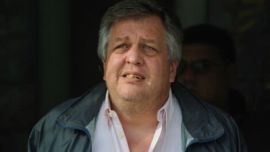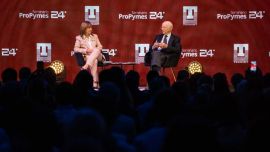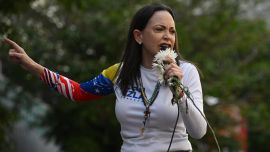A series of memes that have gone viral in Bolivia show President Evo Morales combatting raging forest fires with a toy water gun or a flamethrower, while others superimpose his image on the original cast of the Ghostbusters film.
Many young Bolivians have used the memes to poke fun at South America's longest-serving leftist leader and what they say was his delayed response to thousands of forest fires they blame on his push to develop areas with slash-and-burn agriculture. As the blazes raged, Morales appeared in televised images personally battling flames with a water-filled backpack and nozzle.
Supporters of Bolivia's first indigenous president say that showed the lengths to which he will go to protect the country's forests, but many young people don't buy it. And with young voters making up about a third of Bolivia's electorate, they could determine the October 20 election in which Morales is seeking a fourth term.
"If the president would have acted before, we wouldn't be mourning so much loss or the death of so many animals ... I'm reconsidering my vote," said Rolando Condori, 26, a chef at a restaurant in the city of El Alto.
Condori said he has cast ballots for the 59-year-old Morales since he became eligible to vote at age 18. But now he is listening to other candidates to see who can provide jobs and take care of the environment, which have become top issues ahead of the election.
Outrage over fires
Young Bolivians have been outraged by fires that consumed an estimated four million hectares (15,440 square miles) in the past two months, blazes that flew partly under the radar as world attention focused on fires in neighbouring Brazil's Amazon.
Most of the fires in Bolivia have been in dry forests, prairies and farmland in the southeastern Chiquitania region in Santa Cruz province, although some affected the country's Amazon region.
"Before the fires, Morales had his triumph assured," said Marcelo Carpio of the network of Leaders for Democracy and Development, a political science school.
Opponents say a decree issued by Morales' administration in July allowing some controlled burns for agricultural purposes contributed to the environmental disaster. The government denies the forest fires were caused by the decree, saying farmers have cleared land with burns for years and most are still done illegally.
Corruption concerns
In Morales' 14 years in office, poverty has dropped in South America's poorest country and the president still maintains a broad base of support, even among the young.
"To me, [his re-election] would be good for our Bolivia," said Aldair Hermoso, an 18-year-old who recently quit school to pursue his dream of becoming a professional football player. "Evo Morales will be a good president."
But this support has diminished following corruption scandals, allegations about manipulation of the justice system and his insistence on running for yet another term.
Opinion polls, which say many young voters are undecided, point to a competitive election, and the possibility of a run-off vote. To avoid a runoff and win outright, a candidate must get 50 percent of the votes plus one or get 40 percent and finish 10 percentage points ahead of the nearest challenger.
"This is the first election with Mr. Morales participating in which the chance of him losing is real," said political analyst Franklin Pareja.
Adding to discontent among the young was last year's decision by Bolivia's top electoral court to accept Morales' candidacy for a fourth term despite a constitutional ban and a referendum in which more than 51% of Bolivians rejected his intention to modify the constitution to allow him to run again. Many questioned the independence of the court.
‘I’m analysing my vote carefully’
"Morales is no longer fashionable," said Clara Huanca, a 21-year-old university student.
She said he has failed to provide plans for improving education and that she grew disappointed with Morales when he ignored the constitutional ban on running for more than two consecutive terms.
"I voted for Evo," Huanca, who is of Aymara origin, said at an internet cafe while she finished a project with some of her classmates. "I was influenced by my parents, but now I'm completely against it and I'm analysing my vote carefully."
Many young Bolivians have no recollection of a president other than Morales, and some say they are ready for change despite years of economic and political stability.
But the impact of the youth vote is unpredictable.
While many reject Morales, who started in politics as a coca growers' union leader, they are equally disenchanted with his top rivals, who include former president Carlos Mesa and lawmaker Óscar Ortiz.
Youth on social media
Morales has said he doesn't believe in social media and recently compared them to "sewers" during a public event.
But his campaign has nevertheless created a group of "digital warriors" to reach out to young voters and counterbalance his negative image online.
Young Bolivians make up about 70 percent percent of the country's internet users, but candidates have failed to understand their needs, said Tonny López, a local expert in social networks.
And after 14 years in power, there is a lot of material out there to use to poke fun at Morales, Lopez said.
"It's now in fashion to want to remove Evo [from power], and many don't know why," said Edgar Totora, 19. "I think it's because of what he said himself: 'I'll leave if I lose the referendum,' and he hasn't done it. It's like he's laughing in our face."
– AP, Paola Flores
by Paola Flores, Associated Press


























Comments